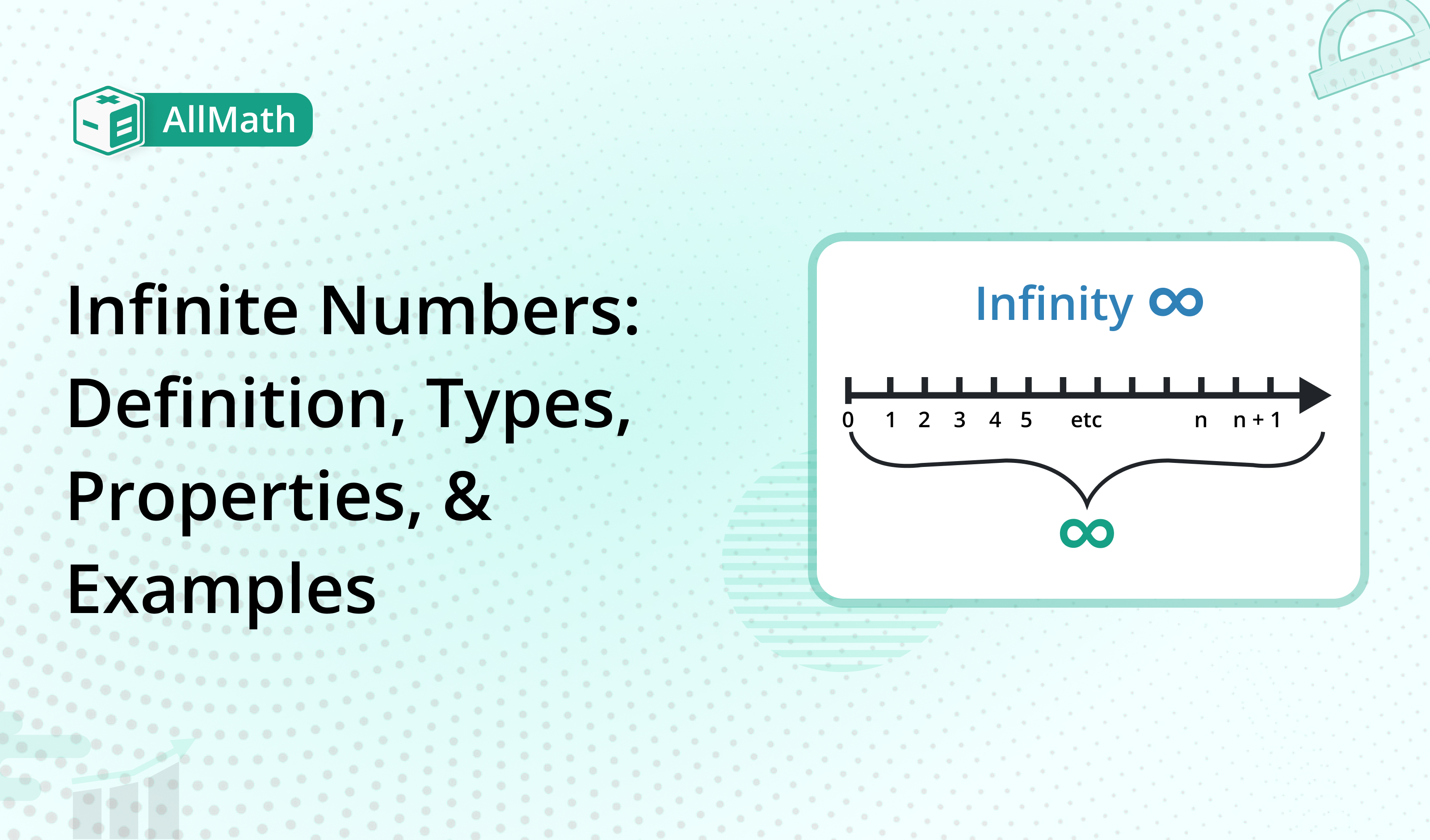To calculate result you have to disable your ad blocker first.
Infinite Numbers: Definition, Types, Properties, & Examples

Publish Date: 22 Sep, 2023
Table of Content
Numbers are like the building blocks for mathematics. Finite and infinite are two distinct kinds of numbers. Finite numbers have a clear beginning and a clear end. They are comprehensible within our everyday numerical experience. A prime example of a finite number is the total number of pupils at a school. Infinite numbers are numbers that are endless and boundless. This concept is really cool and super simple to understand.
We will discuss the types and properties of infinite numbers in this blog. Buckle your seatbelt and get ready to explore the interesting world of infinite numbers.
What is an Infinite Number?
In mathematics, an infinite number is a concept that refers to a quantity that has no limit or endpoint. It is a number that goes on forever without a definitive value. An infinite number cannot be expressed as a precise numerical value like a finite number, which has a specific value and can be counted or measured accurately. It is a fundamental idea in mathematics that helps us explore the boundless world of numbers and their unending nature.
The following are some examples of infinite numbers:
- The number of points on a line
- The number of possible combinations of letters in the alphabet
- Real numbers
- The sand grains on Earth's beaches
Types of Infinite Numbers in Mathematics
Mathematics has different types of infinite numbers. The most common types of infinite numbers are given below:
Countable Infinite numbers refer to a set of numbers that can be placed into a one-to-one correspondence with the natural numbers. It means you can count the set systematically even if it is infinite.
Uncountable Infinite cannot be put into 1-1 correspondence with the natural numbers. This indicates that there is no way to list all the elements of the set in such a way that each element is paired with a unique natural number.
| Examples | |
| Countable Infinite | Uncountable Infinite |
| Whole Numbers | Irrational numbers |
| Fractions | The Decimal numbers between any two numbers e.g. between 1 and 2 |
| All possible words you could make out of the English alphabet | Points lie on a line |
| Prime Numbers | Number of points inside a square or a cube |
| Even numbers | |
Properties of Infinite Number
Let's delve into the properties of Infinite numbers.
Unboundedness:
One of the defining properties of infinite numbers is their unboundedness. They continue to expand and become indefinitely in both positive and negative directions. This unbounded nature allows infinite numbers to be used in various mathematical operations and concepts.
Ordering:
Uncountable Infinite numbers cannot be arranged or ordered in a linear sequence. This is because uncountable infinite sets contain an infinite number of elements that cannot be put into a 1-to-1 correspondence with the natural numbers. We cannot list or order the elements of an uncountable infinite set in a linear sequence.
Closure under Arithmetic Operations:
An important property of infinite numbers is their closure under certain mathematical operations. The result will always be an infinite number if we take any two infinite numbers and add them together. This property also holds for subtraction, multiplication, and exponentiation. This property plays a crucial role in calculus and analysis, where infinite numbers are often encountered and manipulated.
Comparison:
Comparing infinite numbers involves checking if they can be put in a one-to-one correspondence. If two sets can be put into 1-to-1 correspondence, then they have the same cardinality. This indicates that their element count is the same. If one infinite set is a subset of another, then the first set is smaller in cardinality. This means that the first set has fewer elements than the other set.
Numerical Example of Infinite Numbers
Here are a few more examples that illustrate the concept of infinite numbers:
Example 1:
All real numbers between 0 and 1 are infinite. You can keep dividing the interval into smaller segments, and there will always be more numbers between them. For instance, you can have numbers like 0.1, 0.01, 0.001, and so on with an infinite number of decimal places.
Example 2:
In geometry, a line can be extended infinitely in both directions. It has no endpoints and you can keep drawing it indefinitely.
Example 3:
The decimal expansion of π. The decimal representation of Pi is non-repeating and non-terminating, which means it goes on forever without repeating.
Example 4:
The set of prime numbers is infinite. Prime numbers are numbers larger than 1 that can only be divided by themselves and by the number 1. There is no largest prime number, and you can always find more prime numbers by searching.
Conclusion
We have discovered that infinite numbers are like numbers that never stop. They help us grasp the idea that numbers can go on and on without any limit. We have discussed different types of infinite numbers. We have examined key properties of infinite numbers.
These properties are fundamental to understanding and working with infinite numbers in various mathematical contexts. Embracing the idea of infinite numbers enhances our grasp of mathematics and broadens our perspective as we explore the captivating world of numbers further

